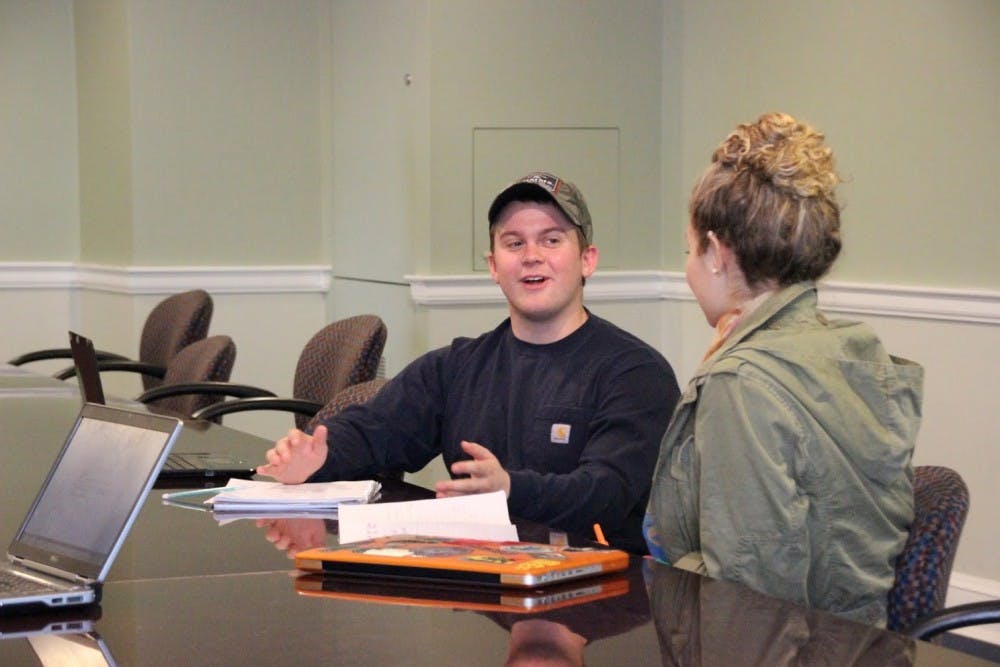Fourth-year College student Jeremy Hurley started the Cans to Cans project last month to increase sustainability on Grounds and support local homeless shelters.
His means? Trashbags full of soda and Natural Light.
The project involves a three-step process: collecting aluminum waste from fraternity or club houses, taking the waste to Cycle Systems for a compensation rate of 60 cents per pound and using the money to buy canned goods for local food banks and homeless shelters.
“[Cans to Cans] promotes sustainability, recycling and a greener U.Va.,” Hurley said. “It helps clean up various houses on Grounds [and] … the greater Charlottesville community benefits from it because you’re donating the money back into food banks and homeless shelters.”
Hurley, who came up with the idea for Cans to Cans in his global sustainability course last semester, began collecting waste in January. Alone, Hurley is able to collect more than 30 pounds of aluminum waste in one week. With new volunteers, he expects this number to increase to 50.
“It’s not hard to get one pound of scrap metal,” Hurley said. “There’s a lot of unnecessary waste [on Grounds], especially along the lines of aluminum waste.”
Although Hurley began the project collecting cans on his own, his project has recently generated outside interest, especially within the Greek community. Hurley said there are currently 30 students working on Cans to Cans, and he expects this number to grow in upcoming weeks.
“Up until now, it was a one-man, unorganized team,” Hurley said. “Now that rush season is over, there are some really solid dates when people will be having activities and we’re hoping to schedule [clean up] events in the future.”
When Hurley first introduced Cans to Cans, one of the project’s largest supporters was Sigma Chi — also one of Hurley’s weekly pickup sites. Fourth-year Commerce student David O’Hara, outgoing vice president of Sigma Chi, said he is collaborating with Hurley to create a more organized collection process.
“I think what we’ll do in the future is I’ll just hand him our social schedule and I’ll tell him [when] to expect a lot of can output... and then he can plan on those days,” O’Hara said. “It’s a combination of planned times for [pickup] and also just coming whenever we need it.”
While Cans to Cans is currently working with five fraternities and several club and sports teams, the organization hopes to increase the number of pickup locations in the future.
“Hopefully it can expand to at least all the fraternities on Grounds, because I know there’s definitely a lot of can output there,” O’Hara said. “But I think it can grow even bigger than that too, out to 14th street, 15th street [and] JPA — anywhere where there’s cans that could be recycled that aren’t [being] recycled.”
Although Cans to Cans is a new initiative at the University, Hurley considers every opportunity to collect waste worthwhile, even if it will only bring in a small amount of revenue.
“I’m not going to turn people away because [they only have] two bucks [worth] of cans,” Hurley said. “When it comes down to it, it only costs two bucks to feed one homeless or needy person per day. Every little bit really counts.”
As the project attracts more volunteers, Hurley and O’Hara hope more students will recognize the importance of sustainability at the University.
“There’s a lot of opportunity the University has to become greener and student involvement is a key part of that, so Jeremy taking this on himself [and getting] Greek [life] to become more green gives a lot of opportunity to expand and I think it could have a pretty big impact,” O’Hara said.
For Hurley, the project not only makes the University greener, but also connects students with members of the greater Charlottesville community.
“[Cans to Cans] has a place not only within the U.Va. community, but also within the Charlottesville community,” Hurley said. “I think oftentimes we are disassociated with the Charlottesville community, so I feel like this [project] is another way to make that bond stronger.”







